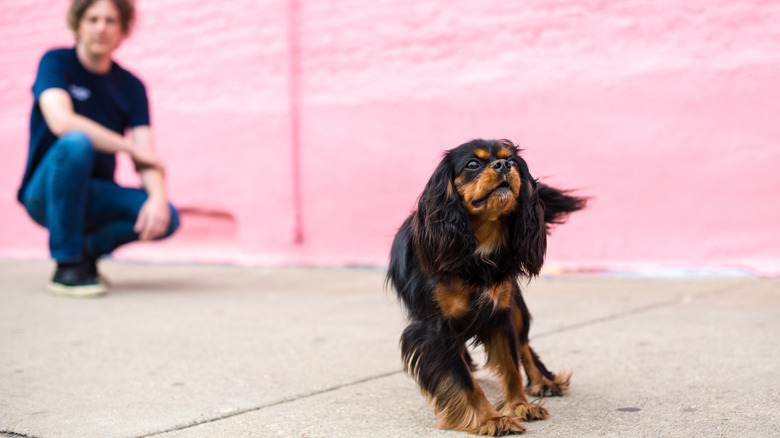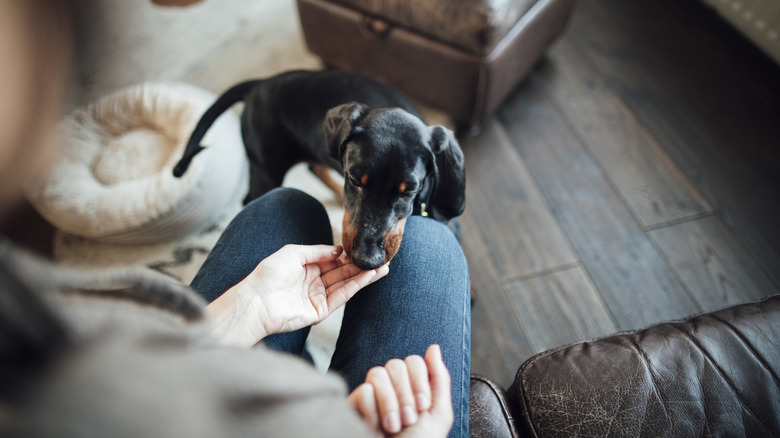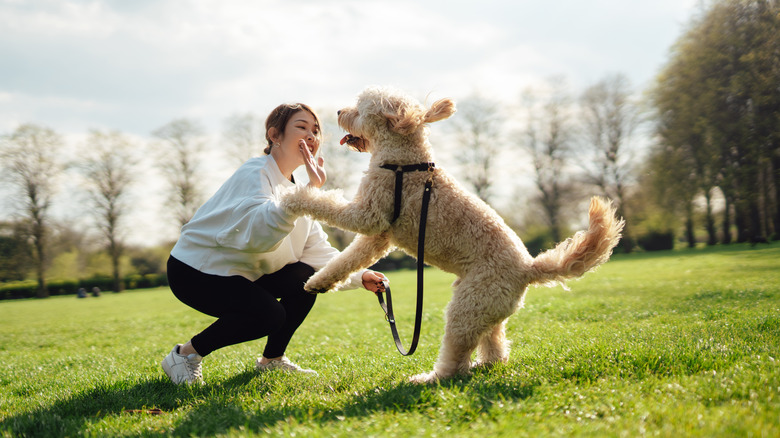Dog Doesn't Like Their Name? This Sneaky Fun Game Could Change That
Whether your pup has a popular name like Max or Bella or an unusual dog name like Mr. Sniffles or Anne Hathawag, it probably means a lot to you. You may have spent days or weeks getting to know them as a puppy, waiting for the perfect choice to reveal itself. Or maybe you always wanted a pup named Dwayne "The Dog" Johnson, and then you saw an adorable pooch in the shelter and knew for sure you'd found him. However you chose your dog's name, it can be confusing, frustrating, and devastating if they stop responding to it or it seems to provoke a negative reaction. Luckily, there's a simple game you can play to retrain your pup to love their name.
To play the name game, American Kennel Club advises taking your pup to an enclosed area, like a room or a fenced yard, and bringing a handful of treats. When your dog isn't looking in your direction, say their name in the brightest, happiest, most cheerful voice you can muster. The second they turn your way, say something like, "Yes!" or "Good!" to let them know that's the action you're looking for. Then give them a treat. Play the game for as long as it's fun for both of you, and feel free to repeat as needed.
Why does the name game work?
The name game is a great tool because dogs respond extremely well to positive reinforcement training – that is, a treat or loud, encouraging praise when your pup does something right, like sit on command or respond to their name. This is the preferred method of training according to a 2013 study published in the Journal of Veterinary Behavior "because punishment seems to be associated with an increased incidence of problematic behavior."
It may seem like common sense; as a human, you probably agree that it's nicer to get a reward for doing something right than being punished for doing something wrong. But an outdated method based on something called dominance theory used to be the go-to way to train dogs. The theory posited that dogs who misbehave are trying to be the "alphas" of the pack, so human trainers must "dominate" them.
Dominance training was physically harmful and terrifying for the dogs, and the science behind the method has been debunked. No one likes being yelled at, chastised, or physically punished, including dogs. So saying your dog's name and waiting until they look at you to lavish them with praise and treats is the way to go, and it will give you and your pup the best chance of restoring a positive association with their name.
How to prevent negative associations with your dog's name
Some dogs might not recognize their name if they're new to your family, but others might stop responding if they feel their name has a bad connotation. You can prevent negative associations by not using your pup's name to correct their behavior. Try not to say things like, "Simon, get down!" or, "Simon, no barking!" If you do, Simon will eventually connect his name to being corrected, and he might not come when you call him, even if it's to give him a meal or belly rub or because you want to play.
It's more difficult than you might think to stop using your pup's name when correcting them. It takes practice! And no one's perfect. But if you follow this approach and adhere to the do's and don'ts of treats and positive reinforcement while playing the name game, you pup will head your way in no time when you say, "Bark Twain, come!"


